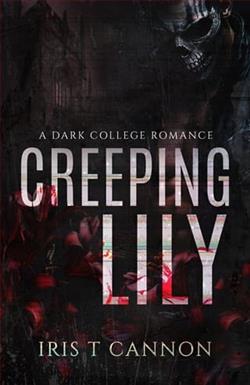Page 12 of Jailer to the Death God
The Queen brushes back a lock of her pale hair. Its end is crusted with dried blood.
Slowly she approaches the door of the house—the residence of a wealthy family, if I had to guess. Like the other streets, this one is empty. Wet black cobblestones reflect the pallid glare of a few streetlamps. Most of the windows in the tall brick mansions are darkened, but a few rectangles of golden light illuminate the gloomy wall of buildings.
The cold gnaws at my bare skin, and my nipples tighten as tiny bumps rise all over my torso. I’ve never felt a sensation like it.
“Stay behind me, and say nothing,” the Queen says over her shoulder.
“I am a god. I don’t follow your orders,” I retort.
There’s no time for her to reply before the door opens, and a servant admits us.
I do not often see grief from this side. I receive the departed souls; I do not deal with those left behind.
Watching the Queen mourn with the dead woman’s family is fascinating to me. The parents of the deceased all but collapse in paroxysms of grief, their sobs and moans ripping through the carpeted silence of the house. The Queen embraces them, pets them, comforts them, while tears course in unending rivers down her own cheeks. She does not scream or wail as they do. She barely makes a sound.
At last she introduces me as a healer from a faraway land, newly arrived by boat. “Rose died to make sure he got here safely,” the Queen tells the bereaved family, and they lift tear-swollen eyes to my face, staring in helpless gratitude. I wonder if they can tell I’m not human. If they suspect as much, they don’t say it.
They lead me to a bedroom where two small figures lie in a huge bed. Their faces are bloated, their arms mottled and blistered from the plague.
“Everyone out,” I order.
“I’m staying,” the Queen says.
I don’t protest.
“It’s all right,” she tells the family, ushering them into the hallway. “We’ll only be a moment.”
5
The death god sits on the edge of the bed and lays back a tendril of hair from one of the girl’s faces. I should have had him cover that sinewy bulk of his with a cape or something—Rose’s family must think it very odd that I brought a shirtless healer out of the icy evening and into their home.
Or perhaps they do not care about such things right now.
Arawn leans farther across the wide bed and presses a palm to each child’s forehead. After a moment, he nods.
“If I do not interfere, they will die,” he says softly. “But they deserve more than that.”
“You’ll spare them?”
“I will. As I told you, deaths are not fated, and preventing them does not alter some great universal plan, because there is no such plan. Death may be a natural end to life, or it may be the product of unstoppable chaos or the result of unfortunate choices. In this case, both chaos and circumstance have doomed them. But as the god of death, I can refuse to accept their demise just yet. I cannot heal them—they will have to endure the pain of this sickness—but I can ensure they recover and live a normal span of years, barring some other illness or accident.”
“You can’t heal them? Can’t you leave some sign for their parents, some proof that they won’t die?”
The death god sighs. “Humans. Always so faithless and suspicious. Very well. I will leave a mark upon them.”
He places his thumb on the forehead of first one girl, then the other. When he moves back, tiny interwoven symbols glow green against their festering skin.
Arawn rises and approaches me. Despite my earlier claim that he doesn’t scare me, I can’t help a swallow of nervousness when he’s this close.
In the confined space of the carriage I noticed his scent—cedar and myrrh, with a hint of sage. I can smell it again now. His very skin seems aromatic—so much so that I’m tempted to lean in and inhale, especially in this room, which reeks of sour sickness.
Instead I spin on my heel and push through the bedroom doors, back into the hall where Rose’s parents, aunts, and grandfather are anxiously clustered, awaiting news about the little girls.
“They must pass through the sickness, but they will live,” Arawn announces. “I wish I could cure them immediately, but at least I can promise you their survival. If anyone else in the house falls ill, send word to the palace, and I will come.”
Rose’s mother catches his hand and kisses it. “Thank you, thank you.”
The death god watches her tearful face with a detached sort of interest, mildly sympathetic. He draws his hand away carefully.















